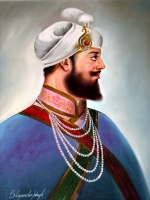Template:AOW198: Difference between revisions
Hari singh (talk | contribs) No edit summary |
Hari singh (talk | contribs) No edit summary |
||
| Line 1: | Line 1: | ||
{{ | {{aowh2|Miri Piri|Miri Piri Diwas|on July 21}} | ||
[[Image:Guru HarGobind Singh.jpg|thumb|150px|right|{{c|Father of Miri Piri, [[Guru Hargobind]]}}]] | [[Image:Guru HarGobind Singh.jpg|thumb|150px|right|{{c|Father of Miri Piri, [[Guru Hargobind]]}}]] | ||
Revision as of 16:05, 10 July 2009

Miri: The word miri has been derived from Persian word “miri”, which itself comes from the Arabic “amir” which literary means commander, governor, lord, prince, etc, and signifies temporal power. The words miri and piri are frequently used together.
Piri: This word has been derived from Persian “pir” literary meaning saint, holy man, spiritual guide, senior man, head of a religious order and stands for spiritual authority.
Miri Piri: The adoption of the term “miri, piri” in Sikh tradition has been made to connote the temporal and spiritual components of life. The term represents for the Sikhs a basic principle which has influenced their political thought and has governed their social structure, political behaviour, organisation, leadership and politics.
Guru Hargobind] was only eleven years old at the time of the martyrdom of his father, Guru Arjun Dev. He was faced with two choices, either to let the Muslim tyrannical rulers (Mughals) and fanatical clergy to annihilate Sikhism and other non-Islamic religions of India or fight the tyranny. Guru Sahib chose the latter and showed extraordinary personal courage, valour and political acumen and manoeuvred Sikhism on its course chartered by Guru Nanak through the crucial initial stages.
The martyrdom of Guru Arjun in 1606 at the behest of the fanatical Mughal Emperor Jahangir prompted the succeeding young Guru Hargobind sahib to refocused the role of the Sikh Gurus. .....More
